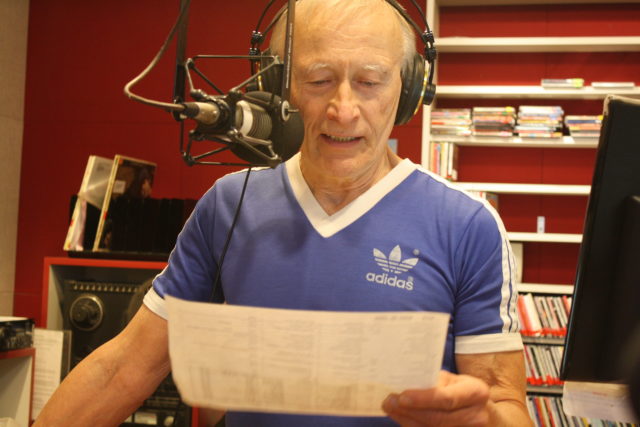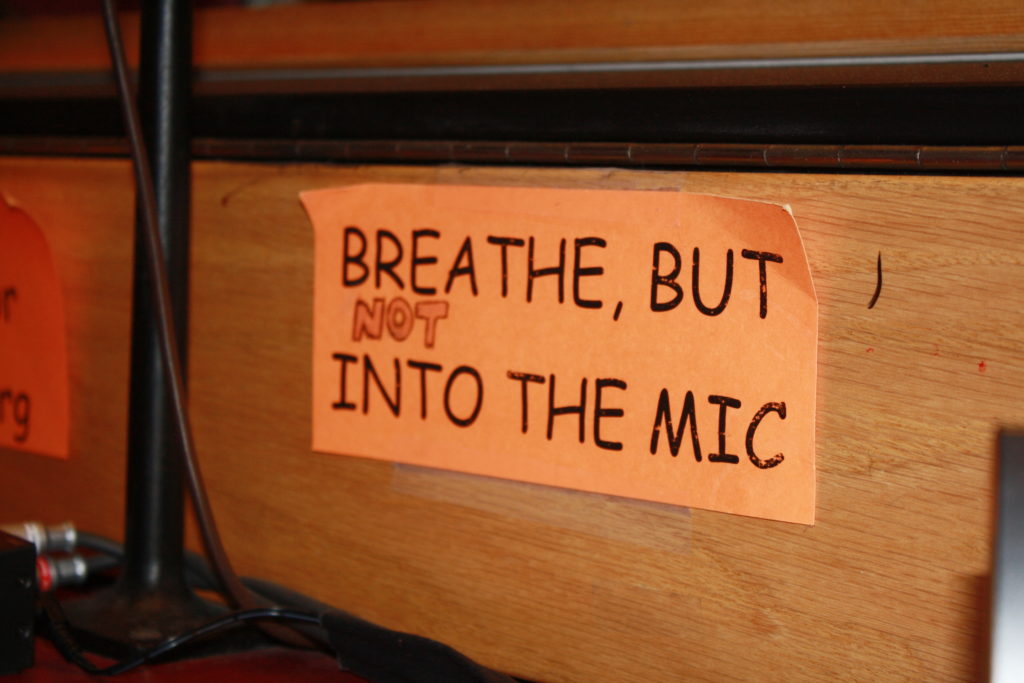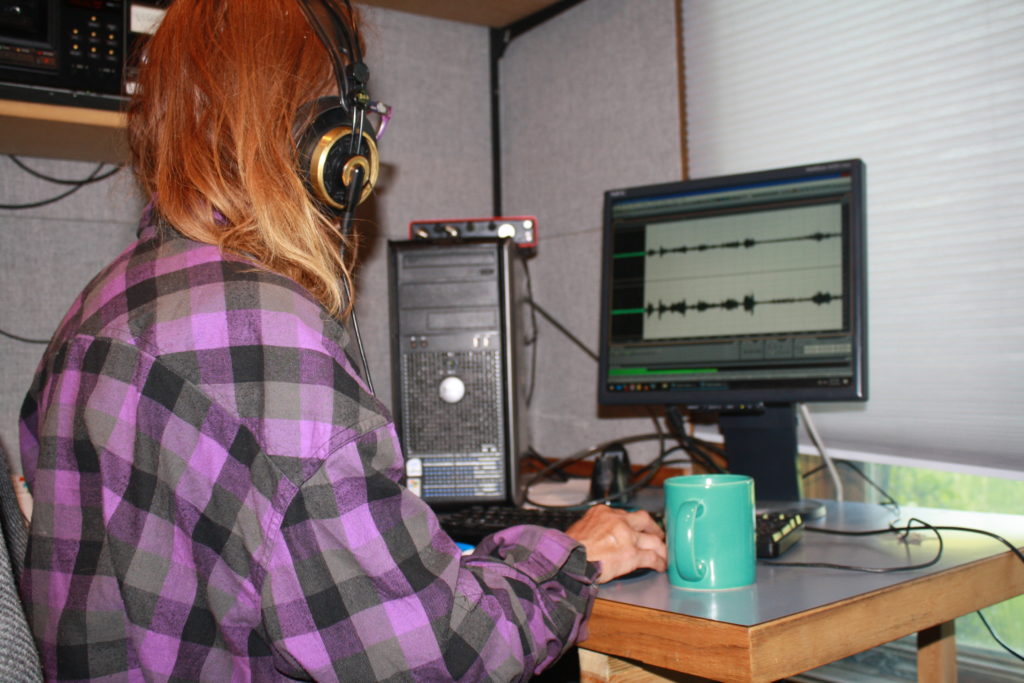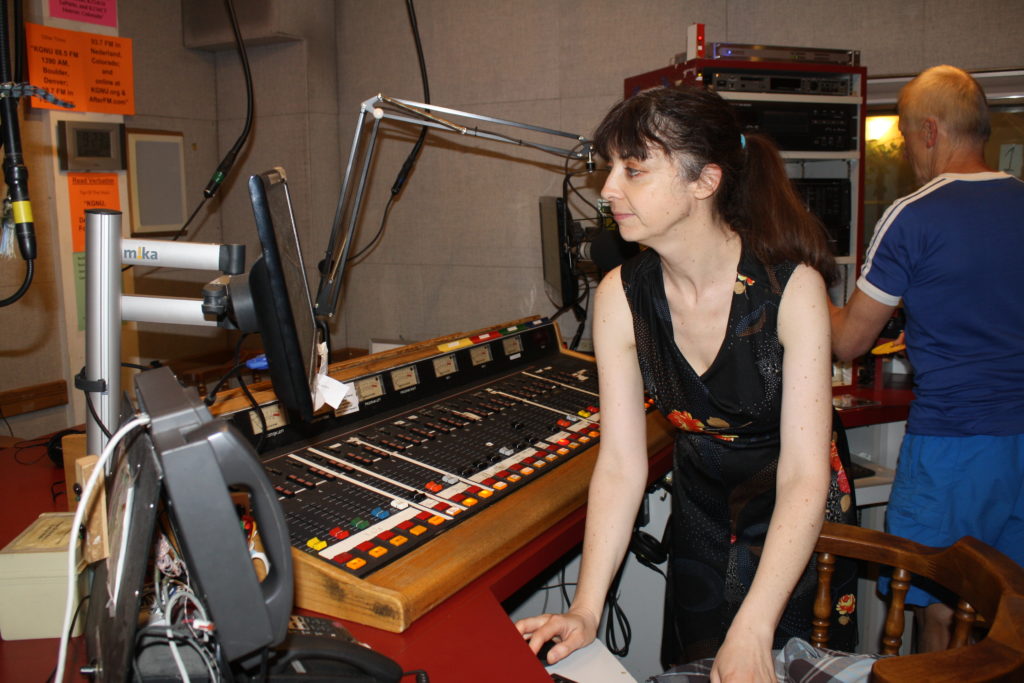
Dennis Glowniak, aka D Rider to KGNU listeners, has 57 seconds before he goes live when Sean Makau, the station’s promotions director, walks in and hands him a piece of paper.
“You got a request for Tom Waits,” Makau says.
Glowniak laughs. “Is that the same guy who requested Tom Waits during my African roots show?”
Maybe he’ll work it in. Probably not.
“Tom Waits is great, I’ve just got a lot of music I want to play,” Glowniak says.
Even though he’s been helming a couple of KGNU’s music shows every month for the past two years, Glowniak still gets nervous before he goes live.
“Especially in the mornings; I never know if my voice will work or not,” he says from across the control board in KGNU’s Red Studio one recent Thursday morning. He’s got a song by California-grown jazz drummer Jamel Ramirez playing as he prepares to launch his shift on the Morning Sound Alternative show.
He’s not far into the program when the studio phone lights up, and no, he says to the person on the other end, he won’t play Tom Waits this morning.
An accountant in his previous life, Glowniak has always been a music aficionado, a sonic explorer with a home collection of more than 7,000 albums, by his account. He’s been volunteering at KGNU for around a decade, one of the hundreds of volunteers that make the local radio station run 24/7/365.
 Glowniak is a part of the community radio station’s 40-year legacy that began in a cottage near the Millennium Harvest House in Boulder on May 22, 1978. In four decades the station has grown, moved, expanded programming and even picked up a sister station in Denver. The station has lessened its reliance on syndicated programming little by little as more and more volunteers create original programming, and it now boasts a staff of nine (pretty robust considering the station had one paid position for many of those early years).
Glowniak is a part of the community radio station’s 40-year legacy that began in a cottage near the Millennium Harvest House in Boulder on May 22, 1978. In four decades the station has grown, moved, expanded programming and even picked up a sister station in Denver. The station has lessened its reliance on syndicated programming little by little as more and more volunteers create original programming, and it now boasts a staff of nine (pretty robust considering the station had one paid position for many of those early years).
Fergus Stone has been with KGNU from the very beginning. Well, he’s always been “nearby.” Stone is a musician and audio engineer who’s called Boulder home for nearly 50 years. He’s a storyteller by nature — or perhaps by way of growing up an Army brat— with a commanding voice in the lower register that reminds of the radio greats like George Feniman or John Fasenda.
Stone is built for radio.
But in the mid-’70s, Boulder didn’t have a true community radio station. There was a Chamber of Commerce station, KBOL, “and their really polite, calm FM side called KBVL that played classical music,” Stone explains. Then there was KRNW, named after the former FCC lawyer Robert Wilkinson who founded the station, which, despite starting as a classical station in the ’50s, by the ’70s had evolved into a rock station playing the big arena albums of the day.
“Against all that there was a general feeling around town, of people who cared about radio at all, or people who wanted to hear better music on the radio, that the university was eventually going to come around and have a non-commercial FM station,” Stone says. “Every other college had one … but in about ’74 we learned that CU had received a construction permit to build a radio station… and had turned it down. They were the first college ever to turn down a construction permit for a radio station.”
The reason, Stone explains, was the president of the university, “a man named Frederick P. Thieme, age 53, didn’t want it because he was worried the United American Mexican students would use it as some sort of power base, that they would get on it and talk about their concerns.”
Across America in the 1960s and ’70s, the Chicano Movement was working to extend Mexican-American civil rights, whether that was in the form of restoration of land grants, farm workers’ rights, enhanced education, voting rights, or simply awareness of cultural history. In May of 1974, six young Latino activists were killed in two carbombing incidents in Boulder. Their deaths still stand as Boulder’s most important and controversial unsolved crime.
“The ’60s had happened and they hadn’t altogether happened in Boulder… or at least they hadn’t at CU, which prided itself on being liberal — it really wasn’t,” Stone says. “The regents were Republicans and the university was under the watchful eye of the Rocky Mountain News, who were always calling teachers out for being Communists.”

It was a man named Steve Elliott, who Stone calls the Free School’s “idea man,” who helped set the wheels in motion for KGNU.
Elliott was a tech guy, the founder of the Alpha Micro Users Society and later on the owner of Boulder’s first virtual reality parlor down on 14th by the Boulder Theater.
“He was a gadfly in the community who does good things and has fun making the world a better place,” Stone says. “So he studied up on what it would take to make a radio station and offered a class that came out in the next Free School catalog: ‘A desperate attempt to start a noncommercial radio station in Boulder.’”
For four years a handful of people — Stone not among them — sat through classes and had meetings, filled out forms and made the occasional trip to Washington, D.C., to “sit with stuffed shirts in their sixth floor chilly offices on a 90-degree day” to get a community radio station up and running in Boulder by the spring of ’78. They secured grants and bought equipment. They worked with the university and city.
“We even had a tower and a transmitter and had done a couple of tests by the time I actually signed on,” Stone says.
He quickly became an integral part of the team, doing two or three shows a week, including his beloved bluegrass and storytelling programs.
He stuck with KGNU through hard times in 1980 when the station actually went dark for a period of time. The board of directors had been taken over by a man from Minnesota Public Radio and suddenly a top-down style of management began to take hold. A newly hired general manager wore a suit and tie to the station every day.
No one had ever worn a suit and tie at KGNU.
Funding dwindled and eventually the GM called an emergency meeting of the board of directors to say that it was time to pull the plug on KGNU. Only five of the 15-member board showed up, Stone says, and they voted to turn KGNU off.
The GM apparently took a vacation to England immediately after that.
“Most of us didn’t see that as the kind of leadership we wanted or [the type of] board of directors [we wanted], for that matter,” Stone says. “The station hadn’t been on the air for three years yet, after four years of getting it on air. Three years and it was done like that.”
With the station flatlining, volunteers began lifesaving measures. They did community canvassing and even some door-to-door work asking for donations. They called a board meeting and fired the members who voted to go off-air and refilled those positions with volunteers who knew how the station actually ran (Alternative Radio host David Barsamian was one of those new board members).
And Stone took the helm of one of the more challenging obstacles to getting the station back up and running: finding a new place to house it.
“It had been the Scientology headquarters, above The Music Store,” Stone says of the place he found that became KGNU’s second location. “It was not in the least wheelchair accessible. The hallway was right above the 55-gallon grease drums from The Aristocrat Greek restaurant that was right around the corner. That was where all of the working musicians had breakfast — the ‘Crat,’ they called it.
“There was a low hum on tapes from that period,” Stone says. “It’s not the electronics of the station. The building was humming from the exhaust fan from The Aristocrat. There was a thin film of grease all through the building. It was that kind of place. Probably all our records and tapes from the time had grease on them.”
Maybe it was because he helped with the move, or maybe it was because his bluegrass and blues shows helped KGNU finally register on Denver’s arbitron (Radio Station Information Profiles), or because he helped raise money to keep the station going or because he lived close by and had a four-wheel drive pick-up truck with stock fences around the side, but in 1981, Stone became the “one paid guy” at KGNU.
He was the program coordinator there for two years, working 60 hours a week until he burned out and decided it was time to pass the torch on to someone else.
“I knew if I stayed any longer I wouldn’t want to come back as a volunteer, and I started out as a volunteer,” he says. “Now, 35 years later, I’m still a volunteer.”
KGNU has that kind of effect on folks, much like Boulder itself. It’s got a radio version of Niwot’s Curse; you can leave, but you’re going to come back. Membership director Nikki Kayser had her first KGNU experience, so to speak, in 1979 when she was interviewed about her involvement with protests against the Rocky Flats nuclear weapons facility.
“I was blown away by the fact that we could say anything,” Kayser says. “Short of a few FCC swear words, conceptually nothing was off the table. I was amazed at that. I had to be reminded by the person interviewing me that that was the case when we took a break because they could see I was tying to hedge what I was saying. ‘All points of view are welcome,’ they told me. And I thought, all points of view? Really? I always remembered that.”
The feeling stuck with Kayser everywhere she went, from living in Central America to Maine.
“After years I came back to this area, in ’04, in part, I would say, because of KGNU,” Kayser says. “I remembered how outstanding it was and the level of people that were involved with KGNU, the level of intellectual curiosity and commitment that people had to various causes that were near and dear to their hearts.”
Kayser volunteered until 2010, when she became the membership director. She co-produces Hemispheres, an hour-long deep dive into matters of international policy and current events, and Dot Org, a show devoted to the work of local not-for-profits. Dot Org serves as a training ground for new KGNU volunteers, which, by the way, Kayser says you can become at anytime you want. There are trainings at 7 p.m. on the first Thursday of every odd month, but if you show up outside of that time, she’ll probably find a way to work in some training for you.
And that’s the beauty of KGNU — it’s about the community, not about shareholders. It’s founded on the radical notion that independent media is actually a conduit for peace, a concept that took hold when the BBC formed after the outbreak of World War II.

News director Meave Conrad calls KGNU a “sanctuary for people.”
“You literally and figuratively give people a voice when you give them a mic,” she says. “Particularly people who have had their stories ignored or mistold.
“It’s a crucial time in journalism,” Conrad says. “We can see what local media can look like when control is taken away from the community. Maybe we can see that we don’t need to reinvent the wheel, we just need to look at the wheels that are already there.”
On the Bill: KGNU 40th Anniversary Events:
May 19: Dining on Air
June 3: Plant Sale
June 30: Alamo Drafthouse + KGNU
July 22: The Charles
Sept. 2: CD & Record Sale
Sept. 7: Denver Anniversary
Sept. 15: KGNU Shining Stars 40th Anniversary Celebration — with keynote speakers Amy Goodman and Jim Hightower
For more info on events, visit kgnu.org. To get involved with events, email Sean at [email protected]














